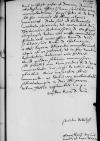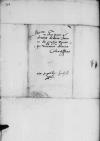List #2345
Stanisław HOZJUSZ (HOSIUS) do Ioannes DANTISCUSVilnius, 1540-09-13
| odebrano Heilsberg (Lidzbark), 1540-09-20 Rękopiśmienne podstawy źródłowe:
Publikacje:
| ||||||
Tekst + aparat krytyczny + komentarz Zwykły tekst Tekst + komentarz Tekst + aparat krytyczny
Reverendissimo in Christo Patri et Domino, domino
Reverendissime in Christo Pater et Domine, domine colendissime.
Officiosissimam servitutis meae commendationem.
Scripsi hodie Reverendissimae Dominationi Vestrae, sed hic nuntius ad illam celerius perveniet. Data sunt ad
Nunc me gratiae illius commendo ac diuturnam incolumitatem felicitatemque adeo illi precor.
Eiusdem Reverendissimae Dominationis Vestrae servitor deditissimus


 BCz 1618, p. 374
BCz 1618, p. 374